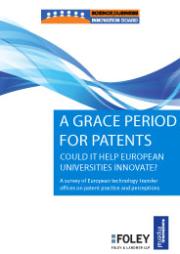European researchers working to advance technology frontiers face a dilemma. To keep their academic careers on track they must publish the results of their work as quickly as possible and present scientific breakthroughs at scholarly conferences. But to reap the benefits of possible commercial applications for themselves and their universities, they must remain silent until a patent is filed.
Get your free copy

Many of the world’s most innovative societies, including the US and Korea, resolve that conflict with a legal grace period, which allows inventors to have it both ways: disclose the discovery in a technical paper or conference, and then have a further six to 12 months to file a patent application. The US grace period was established nearly 200 years ago, and has since spread to many other inventing nations. But no meaningful grace period exists in Europe, and the idea of implementing one has been controversial, with opinions varying by country and sector. To understand these attitudes in the university sector, an important source of innovation in Europe, the Science|Business Innovation Board with partners Imperial Innovations PLC and Foley & Lardner LLP conducted a survey of university tech transfer offices across Europe from November 2012 to January 2013.

 A unique international forum for public research organisations and companies to connect their external engagement with strategic interests around their R&D system.
A unique international forum for public research organisations and companies to connect their external engagement with strategic interests around their R&D system.